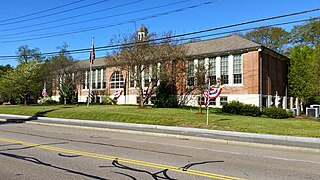
Raynham is a town in Bristol County, Massachusetts, United States, located approximately 32 miles (51 km) south of Boston and 22 miles (35 km) northeast of Providence, Rhode Island. The population was 15,082 at the 2020 census. It has one village, Raynham Center.
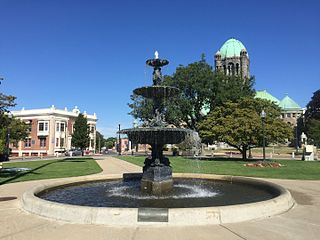
Taunton is a city and county seat of Bristol County, Massachusetts, United States. Taunton is situated on the Taunton River, which winds its way through the city on its way to Mount Hope Bay, 10 miles (16 km) to the south. At the 2020 census, the city had a population of 59,408. Shaunna O'Connell is the mayor of Taunton.

Bridgewater is a town located in Plymouth County, in the state of Massachusetts, United States. As of the 2020 U.S. Census, the town's population was 28,633. Bridgewater is located approximately 25 miles (40 km) south of Boston and approximately 35 miles east of Providence, Rhode Island.

Amos Whitney was a mechanical engineer and inventor who co-founded the Pratt & Whitney company. He was a member of the prominent Whitney family.

Colonel Thomas Handasyd Perkins, also known as T. H. Perkins, was an American merchant, slave trader, smuggler and philanthropist from a wealthy Boston Brahmin family. Starting with bequests from his grandfather and father-in-law, he amassed a huge fortune. As a young man, he traded slaves in Saint-Domingue, worked as a maritime fur trader trading furs from the American Northwest to China, and then turned to smuggling Turkish opium into China. His philanthropic contributions include the Perkins School for the Blind, renamed in his honor; the Boston Museum of Fine Arts; McLean Hospital; along with having a hand in founding the Massachusetts General Hospital.

William Mason was a master mechanical engineer and builder of textile machinery and railroad steam locomotives. He founded Mason Machine Works of Taunton, Massachusetts. His company was a significant supplier of locomotives and rifles for the Union Army during the American Civil War. The company also later produced printing presses.

Charles Tillinghast James was a consulting manufacturing engineer, early proponent of steam mills, and United States Democratic Senator from the state of Rhode Island from 1851 to 1857.
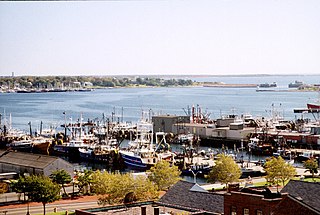
Southeastern Massachusetts is a region of Massachusetts located south of Boston and east of Rhode Island. It is commonly used to describe areas with cultural ties to both Boston and Providence, Rhode Island, and includes the cities of New Bedford and Fall River and their respective suburbs. Despite the location of Cape Cod and the islands to its south, which are the southeasternmost parts of the state, they are not often grouped in this designation. At its broadest definition, it includes all of Massachusetts south of Boston, southeast of Worcester, and east of Providence, Rhode Island, while at its narrowest definition, it is Bristol County and the Western portion of Plymouth County. The region including Cape Cod roughly corresponds with the location of the historic Plymouth Colony, which became part of Massachusetts in 1691.

Samuel Leonard Crocker was a businessman and U.S. Representative from Taunton, Massachusetts. Crocker graduated from Brown University, Providence, Rhode Island, in 1822. Throughout his life, he engaged in various manufacturing and civic interests in his hometown of Taunton and throughout Massachusetts.

The Bridgewater Iron Works is a historic industrial site located on High Street in Bridgewater, Massachusetts, United States, along the banks of the Town River. Previously known as Lazell, Perkins and Company, by the mid-19th century, the Bridgewater Iron Manufacturing Company was one of the largest iron works in the United States, specializing in heavy castings and forgings. The property was later acquired by the Stanley Works, with the surrounding village still known to this day as Stanley.

Colonel Richard Borden (1795–1874) was an American businessman and civic leader from Fall River, Massachusetts. He co-founded the Fall River Iron Works in 1821, and later built several early cotton mills, as well as the Fall River Line, Fall River Gas Works Company, the Fall River Railroad, banks and other businesses. The Borden family would dominate the economic and civic life of Fall River into the early 20th century.

The Old Colony Iron Works-Nemasket Mills Complex is a historic industrial site located on Old Colony Avenue in the East Taunton section of Taunton, Massachusetts, United States, adjacent to the Taunton River at the Raynham town line. The site was first occupied by the Old Colony Iron Company, which had originally been established in the 1820s as Horatio Leonard & Company. The western part of the complex was sold to Nemasket Mills in 1889. The eastern part was acquired by the Standard Oil Cloth Company. The site was added to the National Register of Historic Places in 1984.

The Whittenton Mills Complex is a historic textile mill site located on Whittenton Street in Taunton, Massachusetts, on the banks of the Mill River. The site has been used for industrial purposes since 1670, when James Leonard built an iron forge on the west bank of the river. The first textile mill was built in 1805 and expanded throughout the 19th century. The complex was added to the National Register of Historic Places in 1984, and now contains various small businesses.
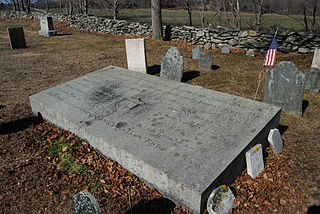
Thomas Baylies was a Quaker ironmaster first in England, then in Massachusetts.
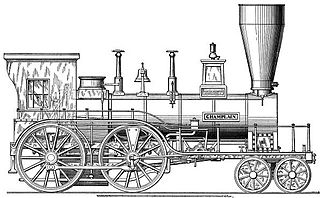
The Taunton Locomotive Manufacturing Company was one of the earliest firms in the United States established especially for the manufacture of steam locomotives. Located in Taunton, Massachusetts, the company was organized in 1849 and incorporated the following year by William A. Crocker, Willard W. Fairbanks, William R. Lee and their associates. Their first engine, the Rough and Ready was delivered in May 1849.

The Taunton Branch Railroad was one of the earliest railroads to be established in Massachusetts, United States. It was chartered by the state in 1835 as a branch of the Boston and Providence Railroad running between Mansfield and Taunton, Massachusetts. The railroad provided a rapid overland connection between the seat of Bristol County and Boston and Providence.
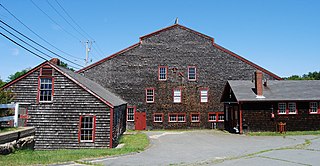
The Tremont Nail Company was a nail manufacturing company located in Wareham, Massachusetts, from 1819 to 2006. The Tremont Nail brand was purchased by Acorn Manufacturing of Mansfield, Massachusetts, where it still produces cut nails and other products for restoration projects. They are the oldest manufacturer of steel cut nails in the United States.
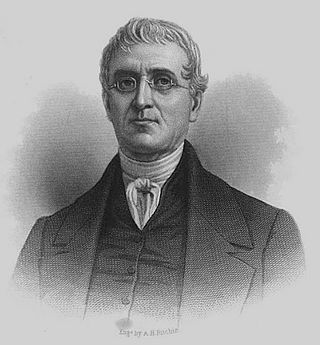
Cyrus Alger was a United States arms manufacturer and inventor.

The Taunton Iron Works was located on the banks of the Forge River in what is now Raynham, Massachusetts. It was the first iron works established in Plymouth Colony, and only the third in New England. Much more successful than earlier works at Saugus, and Braintree, it operated for a remarkable period of two hundred and twenty years, from 1656 to 1876.
Capt. John Ames was a patriot, Captain in the American Revolutionary War, gunsmith, shovel maker, and ancestor of the Ames family of Easton, Massachusetts.




















